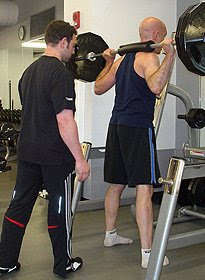 “Walk two miles and call me in the morning.”
“Walk two miles and call me in the morning.”That’s what doctors could soon prescribe if the new leaders of two major medical groups have their way.
“We’re trying to get every physician to prescribe exercise,” says Robert Sallis, a California physician who recently became president of the American College of Sports Medicine. “Physicians have a moral responsibility to inform patients of the danger of inactivity and the health benefits of being more active.”
That’s also the message from the new head of the American Medical Association.
“We are in lockstep with them on that concept,” says incoming AMA President Ronald M. Davis, who is also the director of the Henry Ford Health System’s Center for Health Promotion and Disease Prevention in Detroit. “We need to get doctors to prescribe exercise more and we need to get patients to follow that advice.”
More than half of Americans fail to get the 30 minutes of physical activity recommended daily to provide health benefits, according to the Centers for Disease Control and Prevention.
So many Americans are inactive that some experts have coined a new term for it: sedentary death syndrome. The condition helps cut short an estimated 250,000 lives annually, according to Frank Booth, professor of physiology at the University of Missouri. Research suggests that people who are sedentary spend about $1,500 more annually on medical bills than do their more active counterparts.
“There are also studies to show that they miss more work and are not as productive,” says Sallis. Research shows that regular physical activity improves health by cutting the risk of heart disease, stroke, colon cancer, diabetes and high blood pressure. Even brief bouts of activity several times a day can help control weight and relieve arthritis, anxiety and depression.
“Exercise is medicine,” Sallis says. “We know that it works very well. We just don’t have the proper way to administer it.”
That’s where the doctors come in. Sallis is leading the charge to get doctors and other health professionals to ask every patient at every office visit about their exercise habits.
It isn’t just activity that doctors are being asked to encourage. Harvard Medical School and the Culinary Institute of America recently teamed up to teach physicians to cook more healthfully for their own personal consumption.
The theory is that by teaching doctors how to cook, they may be more likely to encourage their patients to do the same. Harvard also is considering establishing teaching kitchens in hospitals. The goal would be to take patients who have recently been diagnosed with diabetes, heart disease or other nutritionally related conditions, and show them how to make healthier meals.
No comments:
Post a Comment